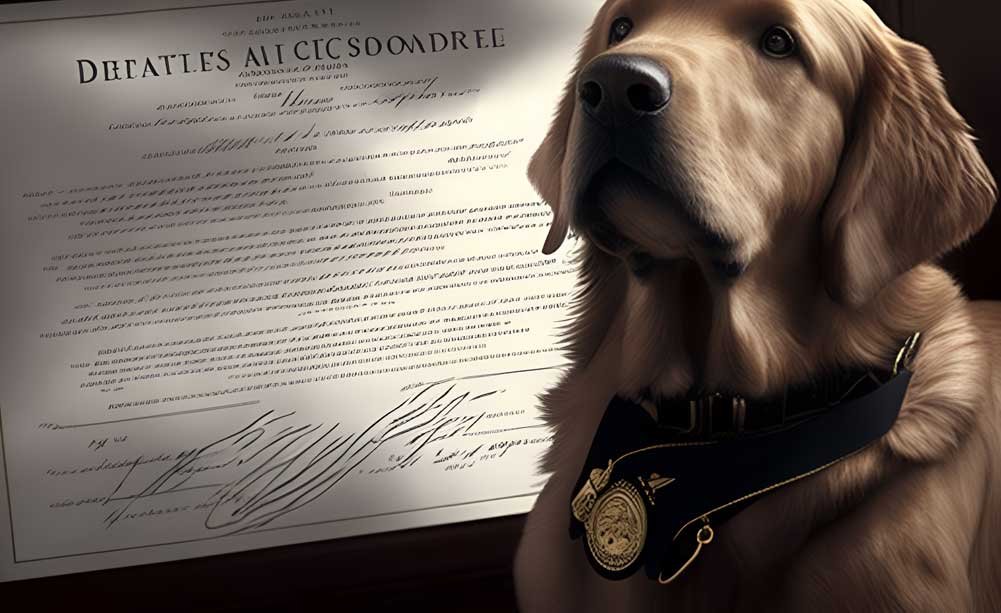Can the Police Ask for Service Dog Proof?
Service dogs play a crucial role in the lives of people with disabilities, offering assistance, companionship, and a sense of security. '
However, there is an ongoing debate about the rights of service dog handlers and the extent to which law enforcement can inquire about these dogs.
One of the primary questions is whether police can ask for proof that a dog is indeed a service animal.
Short answer:
No, the police cannot ask for service dog proof under the protections of the Americans with Disabilities Act (ADA).
The only questions a police officer, or anyone else can ask you about your service dog are:
Is the dog a service animal required because of a disability?
What work or task has the dog been trained to perform?
This article will delve into the legal aspects of this issue, focusing on the Americans with Disabilities Act (ADA) and the rights of both police officers and service dog handlers.
Related Questions
-
In the United States, people can prove that they have a service dog by showing documentation from a medical professional stating that they have a disability and require the assistance of a service animal.
However, according to the Americans with Disabilities Act (ADA), businesses and other organizations are not allowed to ask for documentation or proof that a dog is a service animal.
They are only allowed to ask two specific questions (see answer to question 2).
-
According to the ADA, businesses and other organizations are allowed to ask two specific questions to determine if a dog is a service animal:
Is the dog a service animal required because of a disability?
What work or task has the dog been trained to perform?
These questions help to confirm that the dog is indeed a service animal that is required to assist its owner due to a disability, rather than just a pet.
-
No, according to the ADA, businesses and other organizations are not allowed to ask for papers or documentation proving that a dog is a service animal.
They are only allowed to ask the two questions mentioned above to determine if a dog is a service animal.
It is important to note, however, that if a service dog is misbehaving or causing a disturbance, the owner may be asked to remove the dog from the premises, regardless of whether or not it is a service animal.
Understanding Service Dogs
Before discussing the legality of police inquiries, it's essential to differentiate between service dogs and other types of assistance animals.
Service dogs are specifically trained to perform tasks that assist individuals with disabilities. These disabilities can include physical, sensory, psychiatric, intellectual, or other mental disabilities.
Examples of service dogs include:
guide dogs for the visually impaired
hearing dogs for the deaf
mobility assistance dogs for those with physical impairments
Service dogs differ from emotional support animals (ESAs) and therapy animals. ESAs provide comfort and companionship to individuals with emotional or mental health issues but do not have the specialized training that service dogs have.
Therapy animals are trained to provide comfort and support to multiple individuals in various settings, such as hospitals, nursing homes, or disaster areas. They do not have the same legal protections as service dogs.
The Americans with Disabilities Act (ADA)
The ADA is the primary federal law governing the rights of individuals with disabilities in the United States. Title II and Title III of the ADA specifically cover service dogs and their handlers.
Title II applies to state and local government services, including law enforcement agencies.
It requires public entities to make reasonable modifications in their policies, practices, and procedures to accommodate individuals with disabilities.
Title III, on the other hand, applies to public accommodations, such as businesses and nonprofit organizations that serve the public. It requires them to allow service dogs access to their premises.
Under the ADA, a service dog handler has the right to be accompanied by their service dog in most public places.
This includes government buildings, public transportation, restaurants, hotels, and other establishments that serve the public.
Importantly, the ADA also places limitations on the type of questions and documentation that can be requested about a service dog.
Can Police Ask for Service Dog Proof?
According to the ADA, staff at public establishments or police officers can ask only two specific questions when it comes to service dogs:
Is the dog a service animal required because of a disability?
What work or task has the dog been trained to perform?
The law does not permit police officers or other public entities to ask about a person's disability, require medical documentation, or demand special identification for the service dog.
It is also illegal to request that the dog demonstrate its task or inquire about the dog's certification, training, or licensure.
In other words, the ADA does not allow police officers to ask for proof that a dog is a service animal. This is primarily to protect the privacy of individuals with disabilities and to prevent discrimination.
However, there are a few exceptions to the general rule:
If the handler's disability and the dog's task are not apparent, the officer may ask the two questions outlined above.
If the dog is out of control and the handler is unable to manage the dog, or if the dog poses a direct threat to the health or safety of others, the officer can request the dog's removal.
It's essential for service dog handlers to understand their rights under the ADA and be prepared to answer these two questions if asked by law enforcement or other public entities.
Challenges and Misconceptions
Despite the clear guidelines provided by the ADA, service dog handlers may still face challenges and misconceptions when interacting with law enforcement or accessing public places. Some common issues include:
Lack of Awareness: Not all police officers, business owners, or members of the public are aware of the specific provisions of the ADA relating to service dogs. This lack of knowledge can lead to misunderstandings and, in some cases, discrimination against service dog handlers.
Fake Service Dogs: The increasing number of fake service dogs and emotional support animals has complicated matters, leading to skepticism and increased scrutiny of legitimate service dogs. Some individuals may attempt to pass off their pets as service animals to gain access to places where pets are not typically allowed. This can make it more challenging for genuine service dog handlers to be taken seriously.
Misidentification: The wide range of service dog breeds and tasks may lead to confusion or misidentification. Some people may not recognize a service dog if it is not a common breed or if its task is not immediately apparent. Additionally, the lack of a standard service dog vest or uniform can create confusion.
What Can Be Done?
To address these challenges, various measures can be taken by service dog handlers, law enforcement agencies, and the general public.
Education: Raising awareness about the ADA and the rights of service dog handlers is crucial. Law enforcement agencies should provide comprehensive training to their officers about the ADA's provisions, while businesses and public establishments should ensure that their staff members are well-informed.
Clear Identification: Although not required by the ADA, service dog handlers can opt to use a service dog vest, harness, or other identifiers to minimize confusion and make their dog's role more apparent.
Advocacy: Service dog handlers should be prepared to advocate for their rights calmly and confidently. Knowing the relevant laws and being able to communicate their rights effectively can help avoid unnecessary conflicts.
Reporting: If a service dog handler experiences discrimination or unlawful inquiries, they should report the incident to the appropriate authorities. This can include the Department of Justice, local law enforcement, or an attorney specializing in disability rights.
Conclusion
In summary, the ADA does not allow police officers to ask for proof that a dog is a service animal.
They may only ask two specific questions to determine whether a dog is a service animal, provided that the handler's disability and the dog's task are not apparent.
Service dog handlers should be aware of their rights under the ADA and be prepared to respond to any inquiries they may encounter.
Despite the clear guidelines provided by the ADA, service dog handlers may still face challenges and misconceptions when interacting with law enforcement or accessing public places.
By raising awareness about the ADA and the rights of service dog handlers, promoting clear identification, advocating for their rights, and reporting any discrimination, the challenges faced by service dog handlers can be reduced, and their rights can be better protected.













Inside the Investigation: A Deeper Dive into Police Detective Benefits